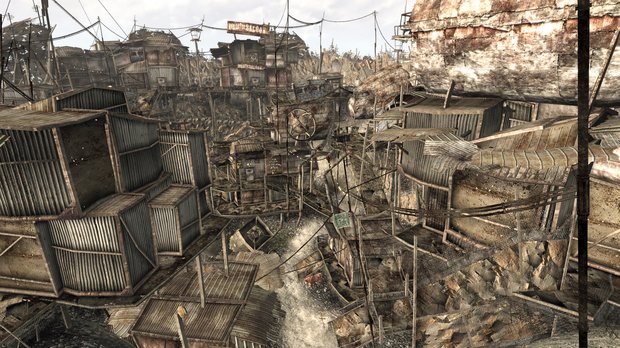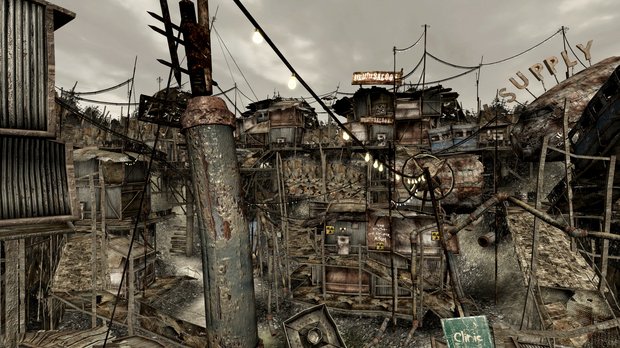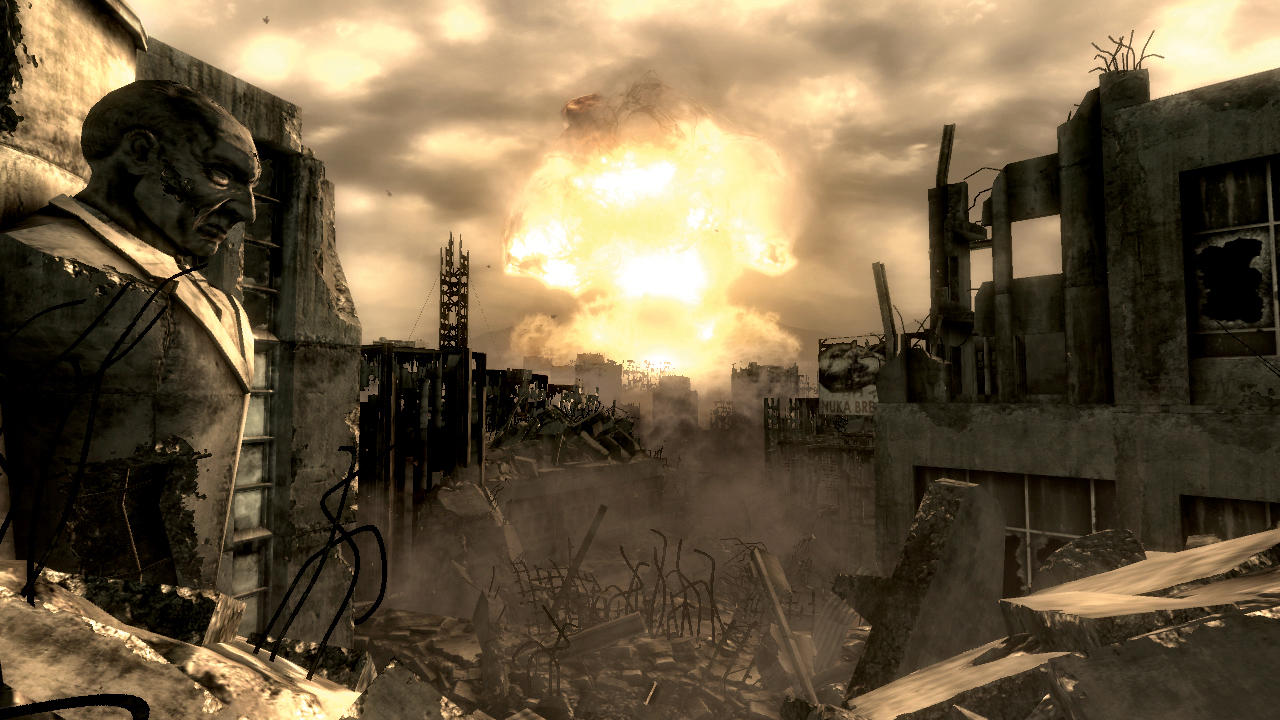Why Fallout 3's scrappiest location is its most beautiful
The recently released Fallout 4 is filled with amazing spaces such as Diamond City which is built within the confines of Fenway Park - a once glorious baseball stadium. But in terms of iconic locations in the series nothing quite compares to Megaton in Fallout 3. Made out of scrap metal, embroidered with aircraft parts and wrapped around a nuclear bomb craterMegaton is so called because the bomb never actually went off. It didn’t go anywhere, in fact, and seems perfectly happy where it is, being worshipped every morning by the town’s resident death cult. Local population: 28 named characters and whoever happens to be dropping by, all living within a screenshot of each other’s front door.
Well, almost a screenshot. One notable frustration of Megaton is that you can just about see all of the place at once – the two pubs, church, hostel, townhouses, waterworks, armoury, shop, public toilets and monument to mass destruction – yet never quite get the measure of it. This amphitheatre of NPC behaviours and routines likes to tease your field of vision every second you’re inside.

After the rampart-ridden Oblivion, Megaton epitomises Fallout 3’s grand adventure in the building of open-world forts. Hardware demands that these Bethesda RPGs feature towns that, the moment you cross that loading-screen threshold, can pack themselves into neat and tidy ‘world models’. Those come in all shapes and sizes in the Capital Wasteland, from the aircraft carrier Rivet City to the Pentagon to the commanding Tenpenny Tower, the latter of which might offer a terrific view of Megaton if – perish the thought – it ‘accidentally’ blew up.
And if, in that realm of extreme possibility, a man (who was never here) approached you in Megaton and spoke (but never had this conversation) about disabling (but also kinda rearming) the bomb, all for the sake of a local landlord’s view from his upstairs window, that would surely set up a pretty awesome payload – sorry, payoff – to a videogame moral choice. Never mind the guilt – imagine the mere logistics of some 28 characters, with all their histories and their dialogue and their church and their toilets, not just vanishing from a game but being utterly vaporised by an RPG version of the Hiroshima blast.
This does, of course, actually happen in Fallout 3, during a game-defining quest called The Power Of The Atom; a game-redefining quest, even, if you live in Japan. Nothing quite sums up that country’s gaping cultural wounds like the ‘defusing’ of the Atom quest by the Japanese ratings board (Megaton’s renamed bomb is benign in this version, the explosion happening at a nondescript military target elsewhere) in a game that was nonetheless voted one of the top ten RPGs ever by readers of Famitsu. Like Germany and the swastika, Japan seems mesmerised by something it can’t quite countenance in pixels.

The Power Of The Atom, it seems, is the power of Megaton, which would amount to very little had Bethesda not followed it to its bitter end. The promise of fire and brimstone hangs over the place until its soil finally does turn to lava, its sky to black, and the horrors of the game’s backstory are wrought in realtime on characters you could almost call friends. That final ignominy falls upon Moira Brown, its kooky shopkeeper, who wanders the ‘apocalypse’ version of Megaton as an inhuman ghoul.
This impinges upon an assumed inalienable right of modern adventures: that you should always, at least until the endgame, be able to revisit and rediscover. The open world should stay open until its quests have been looted. They cost enough to build, after all. Megaton doesn’t just blow that right to smithereens, it walks you through the schematics, has you hook up the wires, then hands you the plunger with a nice glass of port. You scoffingly call the game’s bluff – and then much of your game is gone.
Sign up to the GamesRadar+ Newsletter
Weekly digests, tales from the communities you love, and more

Then, having consigned a substantial chunk of itself to oblivion, the game does something equally selfless – it gives you something you’re supposed to think is rubbish. It asks: was it worth it, your new penthouse in Allistair Tenpenny’s glittering castle, with its uninterrupted view of the bigoted old codger shooting whatever creatures he didn’t pay you to blow up? And how’s your friendship with the reptilian Mr Burke and those other incestuous shut-ins? Or the germ-free water and ghoul-free corridors? Bland, you confess; life without Megaton makes the Wasteland feel small. It makes Fallout 3 feel worse.What tends to happen at this point is that the player pays old Tenpenny a visit, listens to what few dialogue options he has left, then throws him off his balcony. Then they go on a rampage that turns Tenpenny Tower into a tomb before reloading an old save, effectively killing themselves.
Fans of the Witcher games, in particular, will say this constitutes a ‘bad’ moral choice – and they might even be right. The immediacy of consequence in Bethesda RPGs lends itself to the quicksave/quickload habit of rewriting your immediate past, creating a game of no real consequence at all, only choice. Nowhere is this truer than in the demise of Megaton, which it’s hard to imagine many players making a permanent feature of their campaigns.

Inserting a few hours of play between choice and consequence would ‘fix’ this ‘problem’, but would players actually want it? Or do they, in fact, prefer the aesthetic jollies of a ‘what if’ scenario, a nightmare that ends with a quick reboot?
Read more from Edge here. Or take advantage of our subscription offers for print and digital editions.
Edge magazine was launched in 1993 with a mission to dig deep into the inner workings of the international videogame industry, quickly building a reputation for next-level analysis, features, interviews and reviews that holds fast nearly 30 years on.



